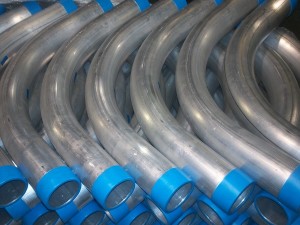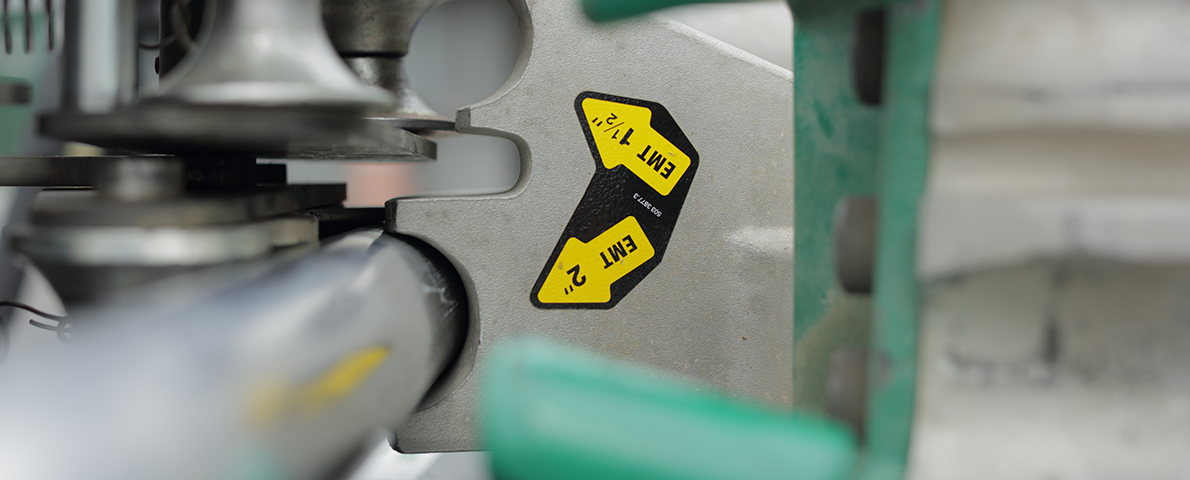Advantages such as light weight, relatively high electrical and thermal conductivity, a protective oxide film, and excellent ductility and machinability make rigid aluminum conduit an exceptional replacement for rigid steel in virtually all locations.

American Conduit is a product brand of Hydro, a fully integrated aluminum company that serves about 30,000 customers globally. We have more than 35 years of experience in the production of rigid aluminum conduit and aluminum electrical metallic tubing, making the products available to customers from coast to coast in a wide range of lengths and diameters to suit even your most complex applications.
Why Choose Aluminum Conduit
If you are accustomed to utilizing galvanized steel conduit, aluminum offers a number of advantages, including:
- Cost per pound savings: Today, rigid aluminum conduit customers enjoy cost per pound savings of 40% to 60% compared to rigid steel conduit.
- Lighter weight: Rigid aluminum conduit is one-third the weight of rigid steel conduit, which enables you to cover three times the distance with the same amount of weight. The lighter aluminum is also less expensive to ship.
- Lower installation cost. The light weight of aluminum conduit makes it easier to work with. A standard 10’ length of 4-inch rigid steel conduit, for example, weighs nearly 100 pounds and requires two people to carry and place it. The same length of rigid aluminum conduit weighs just 34 pounds and can be handled by one person. This equates to fewer workplace injuries and labor savings of 35% to 75% versus rigid steel. The larger the conduit size, the greater the labor savings.
- Strong and durable: American Conduit rigid aluminum conduit uses a 6063 alloy, T-1 temper (former designation T-42). It has a good surface finish with no rust or unsightly discoloration or streaking, even after extended outdoor exposure. Its strength increases at low temperatures, and it does not become brittle like most grades of steel. Because it is an extrusion, aluminum conduit is completely moisture- and vapor-tight.
- Corrosion resistant: One of aluminum’s greatest attributes is that it is naturally rust and corrosion resistant without additional treatment. It resists stress corrosion cracking and is self-repairing if damaged. Because its corrosion resistance is greater than steel’s, it is the choice for many highly corrosive industrial environments, such as sewage plants, water treatment stations, filtration plants and chemical plants. Unlike steel, aluminum conduit requires no maintenance painting or protective treatment.
- Reflective and non-magnetic: Aluminum can be used to reflect visible light and radiated heat, making it extremely effective as an electrical conduit. It is also non-magnetic and useful for high-voltage applications and anywhere magnetic fields come into play.
- Conductive: Aluminum is an excellent conductor of both heat and electricity (second only to copper and half its weight), and offers many shielding and protective qualities.
- Non-sparking and non-combustible: Unlike steel, aluminum conduit does not spark, which reduces the risk of explosion in volatile environments. Aluminum also does not burn and, even at extremely high temperatures, does not produce toxic fumes. Aluminum conduit meets all National Electrical Code Article 500 Hazardous Area Requirements.
Consider the many advantages of aluminum conduit, and save time and money on your next project. Get in touch with American Conduit at 1.800.334.6825 for additional information, or request a quotation today.

